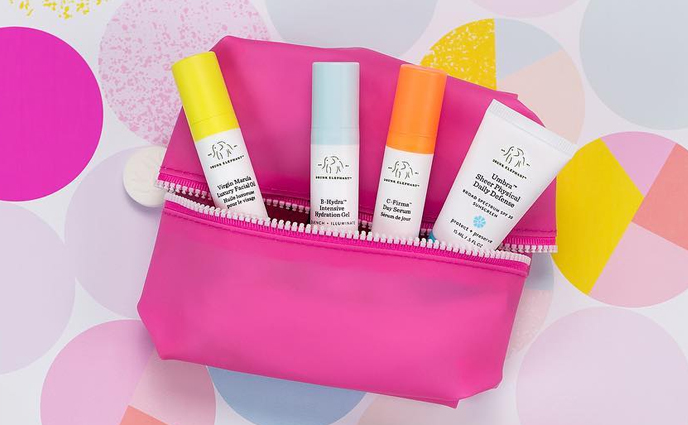Skin care is a science. It's about concocting the right formulas to brighten, treat and moisturize complexions without causing irritation or an adverse reaction. You don't need to have a detailed memory of high school chemistry class to craft a beauty regime, but there are times when having some basic knowledge can help on your quest for beautiful skin. For instance, it can be helpful to know which skin care ingredients can and can't be mixed together for optimal results. It's also important to know how pH impacts skin and the products we're using. It's a quick and simple chemistry lesson that can leave you looking more gorgeous than ever.
Image via Imaxtree
Image via Imaxtree
Let's start with the basics. pH stands for "power or potential of hydrogen" and it's the measure of how alkaline or how acidic aqueous substances are, says Dr. Jamé Heskett, MD, author of "The Well Path." More hydrogen ions make something more acidic or give it a lower pH while fewer hydrogen ions make a substance more alkaline or give it a higher pH.
The pH scale ranges from 0 to 14 with 0 being the most acidic and 14 being the most alkaline or basic. A pH of 7 is considered neutral. Founder and CEO of Shiffa Dr. Lamees Hamdan points out that water has a pH of 7. (Is it all starting to come back now?)
Image via @sansceuticals
The pH scale ranges from 0 to 14 with 0 being the most acidic and 14 being the most alkaline or basic. A pH of 7 is considered neutral. Founder and CEO of Shiffa Dr. Lamees Hamdan points out that water has a pH of 7. (Is it all starting to come back now?)
Image via @sansceuticals
Different organ systems perform best at certain pHs. When they're functioning at the optimal pH, they achieve homeostasis or stability, Heskett says. Skin has a thin, protective layer on its surface called the acid mantle. This acid mantle is made up of sebum (free fatty acids) excreted from the skin's sebaceous glands, which mix with lactic and amino acids from sweat to create the skin's pH, says skin care expert Kat Burki.
Most experts we spoke to say the ideal skin pH is slightly acidic to ward off bacteria and toxins, around 5.5. However, Heskett points out that studies have now shown that the most natural pH for skin is 4.7. "At 4.7, the skin has optimal barrier protection, moisturization and scaling," she explains. "Additionally, this pH does the best job at keeping the resident bacteria (the good bacteria) attached to the skin surface. At higher pH's this bacteria is more easily dispersed, which leaves skin unprotected."
Image via Imaxtree
Most experts we spoke to say the ideal skin pH is slightly acidic to ward off bacteria and toxins, around 5.5. However, Heskett points out that studies have now shown that the most natural pH for skin is 4.7. "At 4.7, the skin has optimal barrier protection, moisturization and scaling," she explains. "Additionally, this pH does the best job at keeping the resident bacteria (the good bacteria) attached to the skin surface. At higher pH's this bacteria is more easily dispersed, which leaves skin unprotected."
Image via Imaxtree
Our bodies are capable of keeping a balanced pH, but choosing the wrong skin care products can throw those systems off and cause issues. NeoStrata training manager Patricia Clare says that if a product is too alkaline, it can strip skin of protective oils, leaving it dry, irritated and vulnerable. It can also cause skin to overproduce oil to make up for what was lost, which can result in sebum "flooding" the surface of the skin. Liz Earle facialist and brand ambassador Sarah Carr adds that too much alkaline can damage the barrier function of skin and lead to decreased antibacterial defense, especially in people suffering from dermatitis or those who have sensitive skin. Skin that is too alkaline also tends to age faster, Burki says.
Conversely, having a product that is too acidic isn't good, either, even though skin's optimal pH is acidic. Too much acidity might not be tolerated by skin and can leave it irritated, red, blotchy and tingly.
Be aware that pH doesn't stop with skin care. There are numerous things that can impact skin's pH, like pollution, sun, water, smoking and even air, says Clare. What's more, lifestyle choices and diet can play a role.
Image via Imaxtree
Conversely, having a product that is too acidic isn't good, either, even though skin's optimal pH is acidic. Too much acidity might not be tolerated by skin and can leave it irritated, red, blotchy and tingly.
Be aware that pH doesn't stop with skin care. There are numerous things that can impact skin's pH, like pollution, sun, water, smoking and even air, says Clare. What's more, lifestyle choices and diet can play a role.
Image via Imaxtree
Using products with the right pH is important for all skin types but it's particularly important for those with sensitive skin, because they'll show the issues first, Clare says. "By respecting the delicate pH of our skin, we are able to really get great results from our skin care and do so in a non-offending way," she says.
In regards to skin care products, pH matters in everything from cleansers and moisturizers to toners and serums. It's key to strike the balance of cleansing without stripping. "pH balanced cleansers and toners are slightly alkaline because alkaline molecules bind to dirt and accumulated oils you want to wash off," Carr says, adding that most of the products on the market today should have a pH balanced formula. If cleansers are too alkaline, they can irritate skin — which is why you shouldn't wash your face with any old bar of soap because they have a pH of 8 or higher.
There are occasions when it's beneficial to use more acidic products than usual, such as vitamin C serums and acid peels. When using acidic products, Hamdan recommends making sure all other products used on the face are pH balanced at around 5 to counteract the negative effects.
Read on for some of our top skin care picks that won't disrupt skin's optimal pH.
Image via Imaxtree
In regards to skin care products, pH matters in everything from cleansers and moisturizers to toners and serums. It's key to strike the balance of cleansing without stripping. "pH balanced cleansers and toners are slightly alkaline because alkaline molecules bind to dirt and accumulated oils you want to wash off," Carr says, adding that most of the products on the market today should have a pH balanced formula. If cleansers are too alkaline, they can irritate skin — which is why you shouldn't wash your face with any old bar of soap because they have a pH of 8 or higher.
There are occasions when it's beneficial to use more acidic products than usual, such as vitamin C serums and acid peels. When using acidic products, Hamdan recommends making sure all other products used on the face are pH balanced at around 5 to counteract the negative effects.
Read on for some of our top skin care picks that won't disrupt skin's optimal pH.
Image via Imaxtree









